

(99+) (PDF) Influence of population versus convenience sampling on sample characteristics in studies of cognitive aging. In Experiments We Trust: From Intuit to Harrah’s Casinos. Regular readers of MIT Sloan Management Review will recognize the name Gary Loveman.

Loveman earned a Ph.D. in economics at MIT and went on to become CEO, president, and chairman of Caesars Entertainment, owner of Harrah's casinos and other resorts worldwide. In MIT circles, Loveman is famous for saying that while theft is a firing offense at Caesars, so too is running an experiment without a control group. (See our conversation from last April with MIT Sloan's Erik Brynjolfsson, “The 4 Ways IT is Driving Innovation.”)
Furud: Mu-ming Poo's Letter to his students in 2002. Written on 오전 11:22 by furud 직접보니 느낌이 더 팍 오는데^^; Mu-ming Poo is head of the Division of Neurobiology, Department of Molecular and Cell Biology at University of California, Berkeley, California, USA.
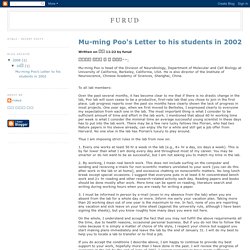
He is also director of the Institute of Neuroscience, Chinese Academy of Sciences, Shanghai, China. To all lab members: The Feynman Lectures on Physics - The Complete Audio Collection (Narrated by Dr. Richard P. Feynman)
Writing Quality. Literature Review & Evaluation. Summarizing research articles. Howtocritiqueajournalarticle. Reading Research. Validity & Design. Replication "crisis" Research Fraud and Debunking. Research Videos. Example Research Topics. Virtual Labs. Lying. Meta-Analysis. Core Research & Stats Vocabulary.
Research Methods. Qualitative Research. PseudoScience. Survey Design. Indices & Scales. Public Policy. HUB-441. Exam Creation. Howtoresearch.pdf. APA privacy patriot act. Welcome to 'CE Corner' “The NSA has built an infrastructure that allows it to intercept almost everything . . . . I can get your emails, passwords, phone records, credit cards.” — Edward Snowden Protecting clients' privacy is clearly one of psychologists' top ethical priorities.
The Two Types of Knowledge: The Max Plank/Chauffeur Test. Charlie Munger, the billionaire business partner of Warren Buffett, frequently tells the story below to illustrate how to distinguish real knowledge from pretend knowledge.

My IRB Nightmare. Rationing in the United Kingdom - Wikipedia. Civilian rationing: A shopkeeper cancels the coupons in a British housewife's ration book in 1943 Rationing was introduced temporarily by the British government several times during the 20th century, during and immediately after a war.[1][2] At the start of the Second World War in 1939, the United Kingdom imported 20 million long tons (20 Mt) of food per year, including about 70% of its cheese and sugar, nearly 80% of fruits and about 70% of cereals and fats.

The U.K. also imported more than 50% of its meat and relied heavily on imported feed to support its domestic meat production. The civilian population of the country was about 50 million.[3] It was one of the principal strategies of the Germans to attack shipping bound for Britain, restricting British industry and potentially starving the nation into submission. First World War A First World War government leaflet detailing the consequences of breaking the rationing laws.
The general strike Second World War Public catering Health effects. How Aristotle Created the Computer - The Atlantic. THE HISTORY Of computers is often told as a history of objects, from the abacus to the Babbage engine up through the code-breaking machines of World War II.
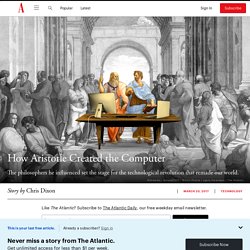
In fact, it is better understood as a history of ideas, mainly ideas that emerged from mathematical logic, an obscure and cult-like discipline that first developed in the 19th century. Mathematical logic was pioneered by philosopher-mathematicians, most notably George Boole and Gottlob Frege, who were themselves inspired by Leibniz’s dream of a universal “concept language,” and the ancient logical system of Aristotle. Listen to the audio version of this article:Feature stories, read aloud: download the Audm app for your iPhone.
Mathematical logic was initially considered a hopelessly abstract subject with no conceivable applications. The Increasing Problem With the Misinformed (by @baekdal) #analysis. When discussing the future of newspapers, we have a tendency to focus only on the publishing side.
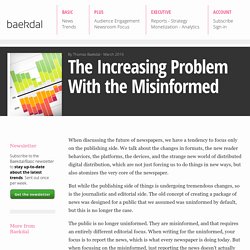
We talk about the changes in formats, the new reader behaviors, the platforms, the devices, and the strange new world of distributed digital distribution, which are not just forcing us to do things in new ways, but also atomizes the very core of the newspaper. But while the publishing side of things is undergoing tremendous changes, so is the journalistic and editorial side.
‘We experiment on human beings!’ OkCupid unapologetic about experiments on users — RT America. ‘I did it for your own good’ is not what you want to hear when the dating site you use sets you up on a bad date.

On purpose. ‘Everybody does it’ is similarly disconcerting. But that’s exactly what OkCupid is saying about experiments involving its users. Chapter 7: Science and Technology: Public Attitudes and Understanding - Public Knowledge About S&T. Importance of Scientific Literacy Understanding Scientific Terms and Concepts Understanding the Scientific Process Technological Literacy Belief in Pseudoscience Surveys conducted in the United States and Europe reveal that many citizens do not have a firm grasp of basic scientific facts and concepts, nor do they have an understanding of the scientific process.
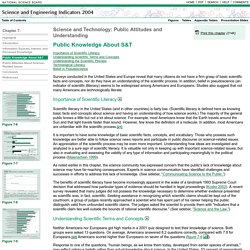
In addition, belief in pseudoscience (an indicator of scientific illiteracy) seems to be widespread among Americans and Europeans. Studies also suggest that not many Americans are technologically literate. Importance of Scientific Literacy Scientific literacy in the United States (and in other countries) is fairly low. Supervised learning: predicting an output variable from high-dimensional observations — scikit-learn 0.18.1 documentation. The problem solved in supervised learning Supervised learning consists in learning the link between two datasets: the observed data X and an external variable y that we are trying to predict, usually called “target” or “labels”.
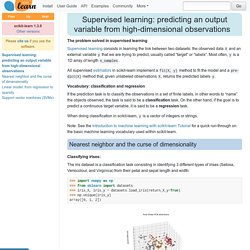
Most often, y is a 1D array of length n_samples. 10. Hypothesis Testing. The Lifespan of a Lie – Trust Issues. It was late in the evening of August 16th, 1971, and twenty-two-year-old Douglas Korpi, a slim, short-statured Berkeley graduate with a mop of pale, shaggy hair, was locked in a dark closet in the basement of the Stanford psychology department, naked beneath a thin white smock bearing the number 8612, screaming his head off.
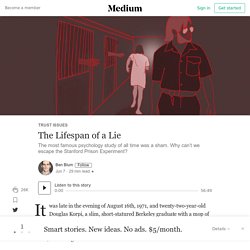
“I mean, Jesus Christ, I’m burning up inside!” He yelled, kicking furiously at the door. “Don’t you know? I want to get out! This is all fucked up inside! It was a defining moment in what has become perhaps the best-known psychology study of all time. Validity 2006. The Problem with "Learning Styles" When it comes to home projects, I am a step-by-step kind of girl. Why the foundations of physics have not progressed for 40 years. I'll take a shot at trying to answer some of your questions: 1.
I originally thought the Heisenberg Uncertainty principle was a natural consequence of using particles (photos) for measurement. That's the observer effect. Employers Want to See These Attributes on Students’ Resumes. Spotlight for Career Services Professionals Career services practitioners should advise their college students seeking full-time employment after graduation to craft a well-written resume. Why? In part, because employers responding to NACE’s Job Outlook 2019 survey said they will seek evidence of solid written communication skills on their candidates’ resumes. When NACE asked employers participating in its Job Outlook 2019 survey which skills and qualities—beyond a strong GPA—they most want to see on students’ resumes, more than four out of five indicated written communication skills, making it the most sought-after attribute this year.
Why the foundations of physics have not progressed for 40 years. Critique of Positive Psychology and Positive Interventions. Informed consent in clinical research: Revisiting few concepts and areas. Understanding Science: An overview. Minimal Risk in Research Involving Pregnant Women and Fetuses. Learning Styles: Concepts and Evidence - Harold Pashler, Mark McDaniel, Doug Rohrer, Robert Bjork, 2008. Learning Styles: Concepts and Evidence - Harold Pashler, Mark McDaniel, Doug Rohrer, Robert Bjork, 2008.
Open Logic Project. Demonhauntedworld. 2 April 2009 - Robot scientist becomes first machine to discover new scientific knowledge. How to Write a Great Research Paper.